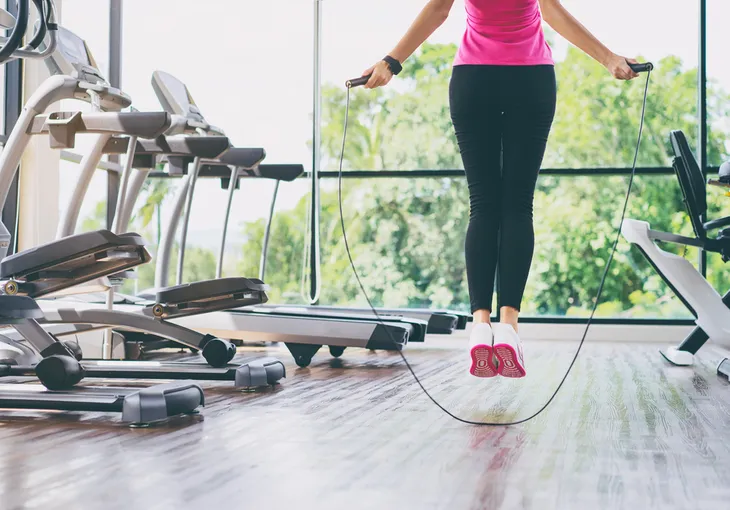No two activities quite go together like exercise and eating. While you may think of eating as a way to fuel your fitness efforts—scientific evidence supports the reverse fact that exercise can also help curb your “hangry” cravings for fatty, calorie, and sugary and starch-laden foods after your workouts.
Adopt these six tactics for busting your unhealthy post-workout cravings…
1. Gravity Is Your Friend
I know, I love swimming and cycling just as much as the next gym rat. However, a 2013 research study published in the journal, Appetite, found that weight-bearing activities have a greater effect on post-workout hunger.
Researchers monitored the post-workout hunger and eating habits of two groups—one group performed weight-bearing moves (i.e., jumping rope) while the second group performed non-weight-bearing forms of exercise (i.e., stationary cycling). Findings revealed that the gravity-fighting group (i.e., skippers) showed significantly lower post-workout hunger cravings.
2. Hydrate, Hydrate, Hydrate
If you’ve ever chatted about your post-workout cravings with a registered dietitian (or read an article about post-workout hunger), you likely know that oftentimes we mistake dehydration for food hunger.
For instance, a study from Purdue University claims that fluid loss (i.e., perspiration) at the gym quite often leads to dehydration disguised as post-workout hunger. So make sure to take a full water bottle along with you when you work out so that you stay properly hydrated during and post-workout. Make a rule to drink first—eat after!
3. Create Body Awareness With Yoga
Mindless eating is a habit that often stems from boredom—as well as a lack of true mind-body awareness. Luckily, the practice of yoga has been shown to help participants get in-tune with the body and significantly decrease binge-eating behavior.
A research program developed by Deakin University in Australia, monitored the eating habits of a group of women who admitted to binge eating. The 12-week yoga program introduced the group to a daily series of yoga postures, meditation and relaxation techniques, and breathing exercises that focused on mindfulness. At the end of the 12-week term, participants reported a significant decrease in binge-eating, but an increase in body image, self-esteem, and overall weight loss goals.
4. Snack Before Exercise
While it makes perfect sense that eating a healthy, balanced snack pre-workout will lead to lower instances of binge-eating after exercise—many folks don’t abide by this common sense piece of wisdom. However, a research study from UK-based Loughborough University, recommends fueling up prior to a workout.
Researchers found that noshing on a light, healthy snack before workouts (i.e., apple slices with raw nut butter) significantly decreased post-workout hunger. Comparatively, those who worked out on an empty stomach, were less likely to be able to control post-workout hunger cravings or perform high-intensity exercise.
5. Treat Exercise As Reward
It’s truly difficult to gain any pleasure from an activity that you deem punishment. For instance, a 2014 study from Cornell University’s Food and Brand Lab found that folks who run, but hate running are more likely to seek out unhealthy food rewards after their workouts.
Alternatively, study participants who approached workouts as the reward—for instance, by choosing an activity that they like (i.e., dance classes, yoga, swimming, etc.)—were far less likely to seek out indulgent, fatty, sugary, calorie-rich foods as rewards after a workout.
6. Intervals Suppress Hunger
If your chosen form of exercise isn’t interval training, perhaps it should be! According to a research study from the University of Western Australia, those who performed interval-style workouts (or 30-minutes of intense exercise) ate far fewer calories after their workouts.
The study monitored a group of males—half of the group performed interval workouts while the other half performed moderate exercise for a similar duration. Researchers discovered that performing intervals triggered a lower ghrelin response (the hormone that stimulates appetite), but increased blood glucose and blood lactate levels, which both suppress hunger.









